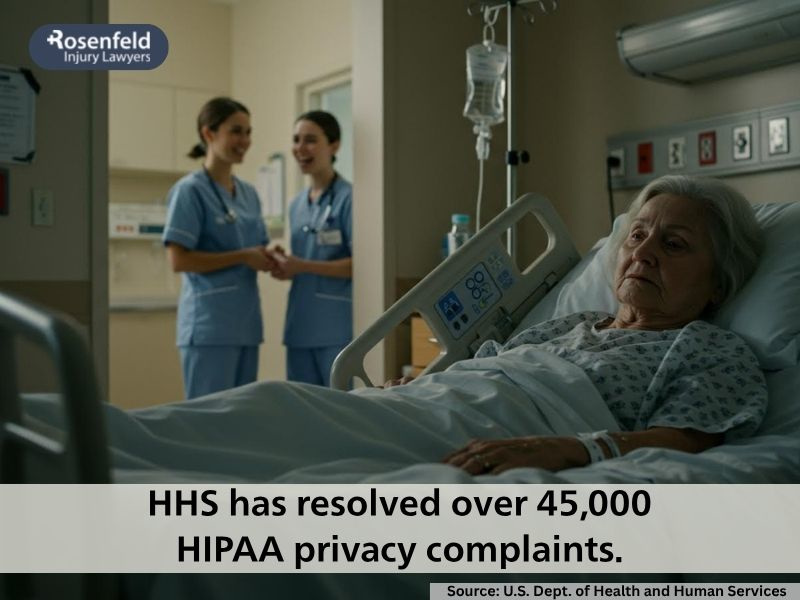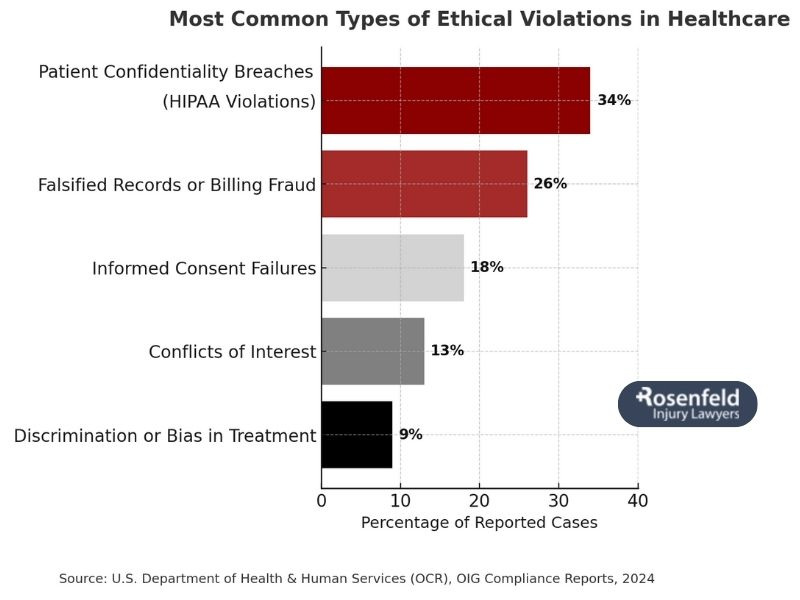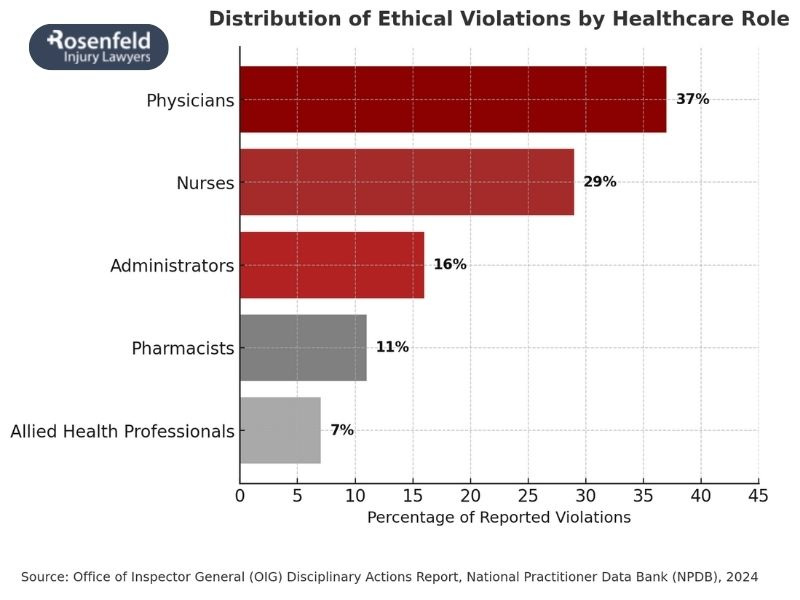What Are Ethical Violations in Healthcare?
Ethical violations in healthcare occur when a healthcare professional, provider, or institution breaches accepted standards of ethical practice, even if their actions don’t break the law.
These violations involve ignoring established healthcare ethics, such as maintaining patient confidentiality or upholding informed consent. While some breaches may seem minor, they can lead to serious consequences for patient care and public trust.
Ethical violations affect more than just the individuals directly involved. They can signal larger problems within the healthcare system, influencing everything from care quality to healthcare management and professional conduct.
In some cases, victims harmed by unethical medical treatment may be entitled to compensation. Understanding how these ethical issues arise is an essential step in holding healthcare providers accountable and protecting the integrity of care across the healthcare industry.

What Are the Most Common Ethical Considerations in Health Care?
Patient Confidentiality and the Health Insurance Portability and Accountability Act (HIPAA)
Patient confidentiality is a cornerstone of ethical practice in the healthcare industry. Under the Health Insurance Portability and Accountability Act (HIPAA), healthcare providers and healthcare professionals are legally and ethically obligated to protect sensitive medical information.
Violations of HIPAA, such as sharing patient details without consent, leaving medical records unsecured, or discussing cases in public spaces, breach both legal standards and moral obligations.
These violations can cause more than embarrassment. Patients may face emotional harm, discrimination, or even job loss if their private health information is exposed.
In an era of expanding medical technology and electronic records, the responsibility of maintaining patient privacy is more important than ever. Failing to do so weakens patient trust and can lead to legal issues, including compensation claims.
Ethical Challenges Involving Informed Consent and Patient Autonomy
Informed consent reflects a healthcare provider’s respect for patient autonomy. Such violations often occur when patients are rushed into procedures, misled, or not fully informed about risks and alternatives. Without a genuine understanding, a patient’s ability to make voluntary decisions about medical treatment is compromised, leading to serious ethical issues.
Healthcare professionals are expected to ensure that patients, or their legal representatives, have clear and accurate information before agreeing to any procedure. This includes discussing side effects, long-term outcomes, and alternative options.
When consent is treated as a formality instead of a meaningful conversation, it becomes an ethical dilemma. It also puts patient care and patient safety at risk. Upholding informed consent as a practice of respect, not paperwork, is vital in maintaining ethical standards in the healthcare system and ensuring patients’ wishes guide their treatment path.
Ethical Dilemma Around End-of-Life Decision-Making
End-of-life care often presents some of the most challenging ethical dilemmas in the healthcare system.
Healthcare professionals may face difficult decisions when patients or family members request life support to be continued or removed, especially when the patient’s condition is terminal or irreversible. Decisions surrounding Do Not Resuscitate (DNR) orders, palliative care, or assisted dying laws test the ethical values and emotional endurance of both medical staff and loved ones.
Balancing the desire to prolong life with respecting a patient’s wishes raises serious legal and ethical issues. Healthcare providers must weigh personal beliefs and legal and ethical issues while considering cultural differences and religious views.
Decision-making in these situations is guided by patient autonomy, but that autonomy must be supported by honest communication and ethical considerations from healthcare practitioners.
Efficient Resource Allocation Without Compromising Care Quality
Distributing limited medical resources fairly is one of the most pressing ethical challenges in modern health care. Whether it’s ICU beds during a pandemic, access to medication, or emergency room services during peak demand, healthcare professionals are often forced to make difficult decisions.
These ethical issues go beyond logistics and tie directly into social justice and fairness in healthcare management. Medical practitioners must ensure that resource allocation does not favor certain patients based on income, insurance type, or social status.

Equity, Bias, and Discrimination Limiting Access to Care
Unequal access to care remains a serious ethical concern in healthcare. Implicit bias—often unintentional—can influence how health care providers deliver medical treatment. Patients may be treated differently based on race, gender identity, disability, or socioeconomic status, which leads to inconsistent outcomes and breaches of ethical standards.
Healthcare ethics demand that all patients be treated equally, regardless of background or ability to pay. When bias affects clinical decisions or access to care, the result is an ethical violation that damages the credibility of the medical profession. Addressing these ethical challenges requires more than individual awareness–it involves systemic change.
Healthcare facilities must implement quality improvement initiatives, ethical training, and enforce professional standards to ensure fair treatment. Efforts to improve access and eliminate bias help rebuild patient trust and ensure care quality for all patients, not just those with private insurance or social privilege.
Professional Misconduct and Boundary Violations
When healthcare professionals cross boundaries with patients, it’s not only a violation of trust–it’s a serious breach of healthcare ethics. Medical misconduct includes any behavior where healthcare workers exploit their role for personal gain, especially in emotionally or physically vulnerable situations. This can include inappropriate relationships, coercion, or ignoring a patient’s rights and wishes.
Some of the most serious violations involve boundary violations that escalate to sexual abuse or harassment. Beyond legal issues, they represent a fundamental breakdown of ethical standards in practice. The impact on victims can be lifelong, including psychological trauma, loss of trust in the system, and worsening health outcomes.
Healthcare providers are expected to respect boundaries at all times. Failing to do so can trigger ethics committee investigations, license revocation, and legal action. Institutions must foster environments where ethical principles and patients’ well-being remain the top priorities.
Professional Integrity and Whistleblowing
Medical practitioners who witness unethical behavior or unsafe practices often face a difficult choice: speak up or stay silent. Whistleblowing is an ethical act that involves reporting misconduct, fraud, or dangerous conditions within a healthcare facility. While it plays a key role in improving patient safety, it can also put the whistleblower’s career and reputation at risk.
Standing up for ethical practice takes moral courage, especially when facing pressure from colleagues or management. Professionals who report violations often do so to protect patients. However, retaliation, job loss, or isolation are very real concerns. Whistleblowers may also be drawn into legal investigations.
Healthcare must support decision-making by providing safe reporting channels and protecting those who come forward. Encouraging accountability and transparency helps reinforce the values of the medical profession and support high-quality care standards across the board.

What Ethical Issues in the Healthcare Industry Can Lead to Legal Challenges?
Ethical issues can lead to legal action when they result in patient harm, breach a provider’s duty of care, or involve direct misconduct. While not every ethical lapse is illegal, many cross into civil or criminal territory, especially when a patient suffers physical, emotional, or financial damage.
Much like negligent security cases, healthcare facilities and medical professionals have a responsibility to maintain a safe environment. When that duty is ignored, and harm results, legal consequences often follow.
There’s significant overlap between ethical issues and legal claims, such as medical malpractice, civil liability, and professional discipline. Examples include diagnostic errors ignored by staff or disrespecting a patient’s right to refuse treatment.
In cases of sexual abuse, for instance, a healthcare provider’s breach of professional boundaries is both an ethical violation and grounds for legal action. Alongside criminal charges, survivors may pursue civil claims for compensation based on the provider’s misconduct and the facility’s failure to intervene.
What Legal Consequences Can Healthcare Professionals Face for Violations?
Medical professionals—including doctors, nurses, and administrators—are expected to uphold strict ethical standards set by professional codes of conduct, institutional policies, and national guidelines like those from the American Medical Association (AMA).
These moral obligations exist to promote health and preserve trust in the system. Professionals are required to demonstrate competence, communicate truthfully, treat patients with respect, avoid conflicts of interest, and maintain patient privacy at all times.
When these standards are violated, the consequences can be significant. Depending on the severity of the ethical breach, health care providers may face internal disciplinary action, mandatory retraining, or suspension. More serious violations can lead to the loss of licensure or board certification.
Civil liability is also common, especially if the misconduct results in patient harm. In cases involving fraud, abuse, or gross negligence, criminal charges may apply.
Legal accountability reinforces the importance of ethical decision-making in medical practice. Violating professional boundaries or failing to meet moral obligations puts both treatment outcomes and medical careers at risk.

What Legal Options Do Patients Have Following Healthcare Provider Violations?
When medical professionals violate ethical principles or patient rights, those affected may pursue several legal avenues.
Patients can file administrative complaints with state licensing boards or professional associations, which can trigger investigations and lead to disciplinary actions such as suspension, probation, or revocation of licensure. These processes help enforce professional standards across the healthcare industry.
Regulatory complaints can also be submitted under the Health Insurance Portability and Accountability Act (HIPAA) or other privacy laws when patient privacy is breached. These violations often involve mishandling medical records, unauthorized disclosures, or failure to secure patient information.
For harm resulting from negligence, boundary violations, or intentional misconduct, civil lawsuits may be filed. For example:
- A breach of confidentiality could lead to both a HIPAA complaint and a civil privacy claim.
- Failure to obtain consent may support a medical malpractice lawsuit.
- Sexual contact with a patient can result in a sexual abuse lawsuit and criminal prosecution.
In more serious cases involving fraud, physical abuse, or assault, healthcare providers may face criminal charges in addition to civil penalties. Law enforcement and prosecutors can investigate and bring charges that could lead to fines, probation, or imprisonment.
Healthcare institutions such as hospitals, nursing homes, and clinics may also face vicarious liability for failing to properly supervise, train, or discipline medical staff who commit ethical or legal violations. Civil litigation serves both to compensate victims and to push the system toward better quality of care and ethical compliance.
What Damages Can Victims Recover Following Ethical Violations?
When ethical issues lead to harm, victims may be entitled to compensation through civil claims. Economic damages cover financial losses such as medical expenses, therapy costs, and lost income from time away from work. These are often necessary to address the impact of poor medical treatment or emotional trauma caused by the violation.
Non-economic damages may also be awarded for pain and suffering, emotional distress, and loss of dignity–especially in cases involving boundary violations, breaches of patient privacy, or disrespect of a patient’s autonomy.
In cases involving intentional or repeated misconduct, such as sexual abuse or deliberate harm, punitive damages may be available. These are meant to punish the offender and deter similar misconduct by others.
It’s important to understand that regulatory penalties–such as licensing board discipline or HIPAA fines–are separate from civil compensation. A lawsuit focuses on the individual harm suffered and aims to restore what was lost, including damaged trust and reduced care quality.

How Long Do Victims Have to Take Legal Action?
Victims of ethical issues in healthcare must act within a specific legal timeframe, known as the statute of limitations. This deadline varies by state and depends on the type of misconduct involved.
For medical malpractice or negligence, most states allow one to three years from the date of the injury, or from the date the harm was discovered or reasonably should have been discovered. If a healthcare provider conceals evidence or commits fraud, some states extend the deadline to allow victims time to uncover the misconduct.
Cases involving sexual abuse or assault often allow longer filing windows, or the statute may be tolled (paused), recognizing the trauma and delayed reporting that usually accompany these violations.
Wrongful death claims are typically subject to a two-year limit from the date of death. However, this can vary by jurisdiction or be extended if institutional negligence continued after the death.
Federal deadlines also apply:
- HIPAA complaints must be filed with the Office for Civil Rights (OCR) within 180 days of when the violation became known.
- Discrimination claims filed through the Equal Employment Opportunity Commission (EEOC) usually fall within a 180- to 300-day window, depending on the state.
In many states, the statute of limitations is paused for minors, individuals who are legally incapacitated, or those who were unaware of the harm caused by the ethical breach, such as in misdiagnosis cases or when a healthcare provider violates informed consent.
Missing the deadline can result in losing the right to pursue compensation or accountability, so victims should consult a legal professional immediately. Early action helps preserve medical records, witness accounts, and other vital documentation needed to support claims involving ethical issues in patient care.
How Injury Lawyer Team Can Help
At Injury Lawyer Team, we understand how deeply personal and painful ethical issues in healthcare can be. Our firm stands with individuals and families who have been let down by those entrusted with their care.
We carefully review medical records to identify signs of misconduct, including violations of autonomy, breaches of confidentiality, or unprofessional behavior. When appropriate, we coordinate with licensing boards or ethics committees to ensure accountability.
If the violation caused harm, we pursue civil claims to help our clients seek the compensation and answers they deserve. Every case matters to us because we know these issues affect not just individual patient outcomes, but the integrity of care across the healthcare system. We believe in your right to be treated with respect, and we’re here to help you fight for it.
Book a Free Consultation
If you’ve been affected by an ethical violation in a healthcare setting, you deserve answers and support from a team that understands the emotional weight of these experiences. At Injury Lawyer Team, we offer trauma-informed legal representation that prioritizes your comfort, privacy, and control every step of the way. All consultations are strictly confidential, and we never charge any upfront fees.
Reach out today to schedule a free consultation. We’re ready to help you explore your options and take the next step toward healing and accountability.
All content undergoes thorough legal review by experienced attorneys, including Jonathan Rosenfeld. With 25 years of experience in personal injury law and over 100 years of combined legal expertise within our team, we ensure that every article is legally accurate, compliant, and reflects current legal standards.








